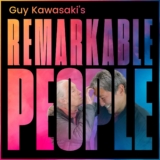My guest is Dr. Christof Koch, PhD, a pioneering researcher on the topic of consciousness, an investigator at the Allen Institute for Brain Science and the ...
Free speech is often treated as a timeless and sacred right. But what if it’s more myth than reality? This week, Sean is joined by historian Fara Dabhoiwala, ...
Are we falling for the biggest money traps of our generation? And what are the money habits that actually build millions? Raoul Pal, Jaspreet Singh, and ...
Scott speaks with Barbara F. Walter, professor at UC San Diego and author of How Civil Wars Start, about what the Charlie Kirk assassination reveals about ...
We’ve got a bonus episode for you on Remarkable People! This feedswap with Rapid Response features Canva co-founder and COO Cliff Obrecht. For ...
As read by George Hahn. https://www.profgalloway.com/own-goal/ Learn more about your ad choices. Visit podcastchoices.com/adchoices
Last month, President Donald Trump announced an unusual deal. Intel, the biggest microchip maker in America, had agreed to give the United States a 10 percent ...
Want to start your own million dollar business with less than $1k? Get the guide: https://clickhubspot.com/ejn Episode 744: Sam Parr ( ...
What does it take to “play 3D chess at 250 miles an hour”? And how far will $12.5 billion of “Big, Beautiful” funding go toward modernizing the F.A.A.? (Part ...
In this conversation from Lenny’s Podcast, Ben Horowitz joins Lenny to discuss the psychological muscle every founder needs, why hesitation can be fatal for ...
Producer’s note: This episode was recorded prior to Charlie Kirk’s death. Scott answers listener questions on why working-class voters feel left behind in ...
In today’s Most Replayed Moment, Charlie Houpert reveals the move that changes how people see you – from job interviews to everyday conversations. Learn ...
- « Previous Page
- 1
- …
- 20
- 21
- 22
- 23
- 24
- …
- 574
- Next Page »



